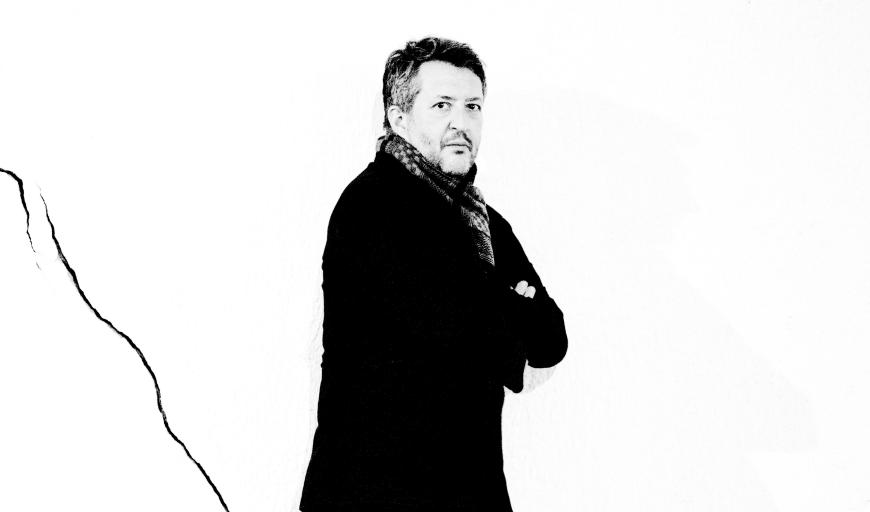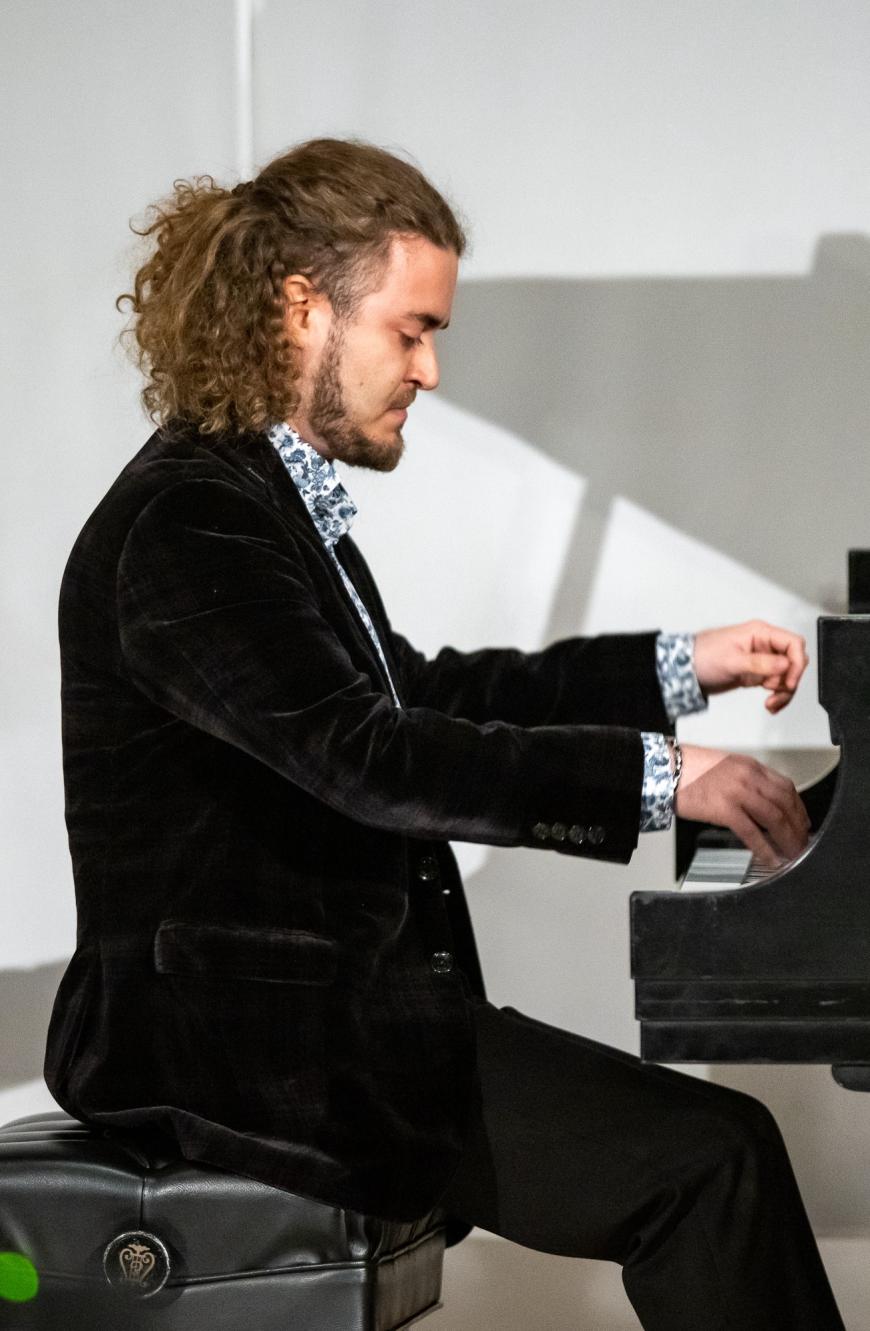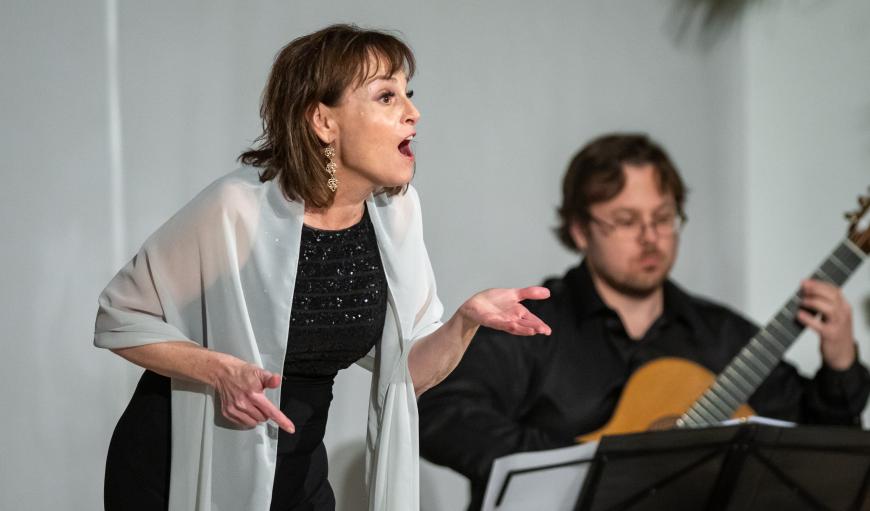
Thomas Adès, the onetime prodigy who can now be said to have fulfilled his promise as a British music master, turned 50 on March 1, 2021. But the world hardly took notice of it then. The COVID-19 shutdown of all concert activity made sure of that.
The Jacaranda Music series had planned a celebration, albeit on a more modest scale than what the Los Angeles Philharmonic had planned around that time, both of which had to be postponed. By April 2022, with pandemic restrictions eased, the LA Phil got around to presenting Adès’s impressive complete Dante Project. Then last weekend, on Saturday night (March 4), three days after Adès’s 52nd birthday, Jacaranda followed through with its Adès program at First Presbyterian Church of Santa Monica — now billed as a “belated 50th-birthday tribute.”
Jacaranda Artistic/Executive Director Patrick Scott’s always-extensive, always-fascinating program notes, which are better absorbed at home than amid the social distractions at the church, painted a detailed, encyclopedic, at times opinionated picture of British music, culture, and politics during Adès’s formative years. Though the triple-threat composer/pianist/conductor was not present, the performers sang “Happy Birthday” for him at the preconcert talk anyway. I need not repeat the cliche about delayed good intentions and follow-throughs.

Right from the top, a good deal of time was spent exploring various miniature permutations of the music from Adès’s third opera, The Exterminating Angel (2016). The Blanca Variations for piano comes from the music for Blanca Delgado, a hired pianist for Act 1’s dinner party scene. A fairly plaintive opening theme is interrupted by a wild run, after which the pianist — in this performance, Andreas Apostolou — enters and reenters some strange territory.
Next, in their U.S. premiere, came four Berceuses from the opera, scored for clarinet (Micah Wright), viola (Alex Granger), and piano (Valerie Stern). They were generally tonal in language, with one of them building toward a yearning climax, giant piano chords in the bass signing it off, and the last one a true subdued lullaby with a slow rocking-cradle rhythm.
The third set of Angel-derived music was the first performance of three songs for three different women in the opera as arranged by guitarist Michael Kudirka (who performed the guitar part in three of the opera’s productions, as well as here), sung in a fluttery voice and acted out by mezzo-soprano Kathryn Krasovec, who also played chiming chords on the piano. The problem of translating Adès’s swooping part for the electronic ondes Martenot was convincingly solved by Kudirka sliding his fingers carefully down the neck of his acoustic guitar.
There is also an Exterminating Angel Symphony, which Mirga Gražinytė-Tyla and the City of Birmingham Symphony Orchestra played at Disney Hall last October; in other words, there’s something for almost everyone to perform in lieu of a full production.
From here, the concert doubled back some two decades to an early string quartet, Arcadiana (1994), in which the Lyris Quartet heightened the impact of its lyricism-with-an-edge portamentos, grappling mightily with the grind-it-out passages and realizing the humor of the paraphrase on a Papageno aria from The Magic Flute. Gloria Cheng had the snap of the strange rhythmic gaits and glittering colors of the three Mazurkas for piano (2009) securely in hand. The Court Studies from The Tempest (2005) represent another spinoff from an opera (Adès is certainly an industrious self-promoter of his stage works), written for clarinet (Wright), violin (Xenia Deviatkina-Loh), cello (Marshall McDaniel), and piano (Stern). They are lighter in mood, with a pronounced neoclassical-Stravinsky rhythmic influence.

From all of this, a picture of Adès emerges as a composer of complex, at times rigorously difficult, stylistically ambiguous chamber music that leans toward the tougher school of British composition from the latter third of the 20th century and beyond, but not as strenuously as it could. That said, you have to hear the orchestral music of Adès to get a truer picture of his evolution toward eloquence and emotional force while still using all of the tools of a 21st-century composer.
There was one more performance that capped this expansive program. Turia (2017), a five-movement concerto for guitar and seven instruments by the Spanish composer Francisco Coll — said to be Adès’s only student so far — was supposed to have received its U.S. premiere on April 6, 2021, with Adès himself conducting the LA Phil New Music Group. The shutdown scotched that, so Jacaranda found itself hosting the U.S. premiere instead.
With Kudirka back on guitar and Daniel Mallampalli leading the Jacaranda Chamber Ensemble, Turia — named after a river in eastern Spain — is drenched with local Spanish harmonic color, yet it also goes avant-garde crazy, with a questioning guitar getting swamped by abrasive answers from the seven-piece band. The piece’s individual character speaks well of Adès for not imposing his will upon that of a talented protege.




